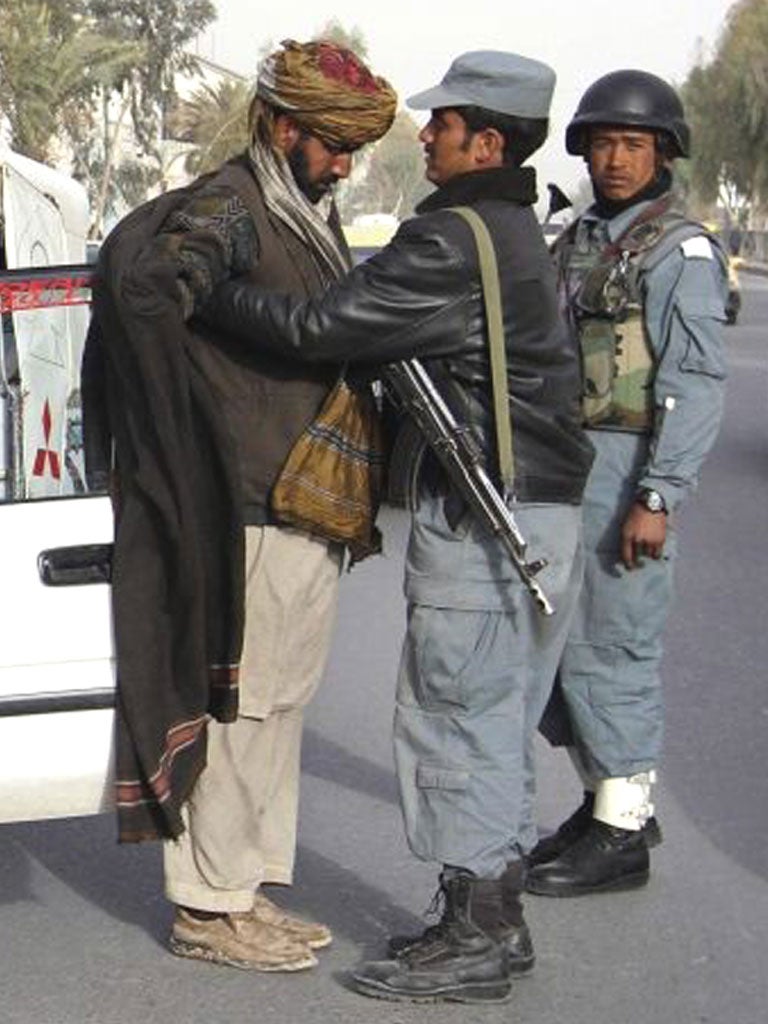Witness tells of rogue soldier's killing spree as Afghan tensions rise
US soldier is believed to have suffered traumatic brain injury and had problems at home

Your support helps us to tell the story
From reproductive rights to climate change to Big Tech, The Independent is on the ground when the story is developing. Whether it's investigating the financials of Elon Musk's pro-Trump PAC or producing our latest documentary, 'The A Word', which shines a light on the American women fighting for reproductive rights, we know how important it is to parse out the facts from the messaging.
At such a critical moment in US history, we need reporters on the ground. Your donation allows us to keep sending journalists to speak to both sides of the story.
The Independent is trusted by Americans across the entire political spectrum. And unlike many other quality news outlets, we choose not to lock Americans out of our reporting and analysis with paywalls. We believe quality journalism should be available to everyone, paid for by those who can afford it.
Your support makes all the difference.A witness to the killing spree that left 16 Afghan civilians dead spoke of how the rogue American soldier responsible for the deaths moved from room to room looking for his victims.
"I heard a gunshot. When I came out of my room, somebody entered our house," a 26-year-old villager named Mohammad Zahir said.
"After that, I saw him moving to different areas of the house – like he was searching." Mr Nazir's father, unarmed, then took a few steps out of his bedroom. Then the soldier fired.
The harrowing account of the attack came as tribal elders, local councillors and relatives of the men, women and children killed in their homes by the rogue soldier warned yesterday of violent protests in the Afghan city of Kandahar if the US did not act swiftly to prosecute the shooter.
Haji Aghalalai Dastgiri, an elder from Panjwai and a member of Kandahar's provincial council, told The Independent: "People [at the meeting] requested that either the US government or the Afghan government prosecute the killer as soon as possible. If not, there will be an attack on the US base." Afghan parliamentarians called for the soldier to be tried in an Afghan court. The threat came as more details emerged about the identity of the suspected killer.
He is believed to be an Army staff sergeant who has spent more than 10 years in the US forces and completed multiple tours in Iraq.
It emerged yesterday that the soldier had a traumatic brain injury at one point and had problems at home after his last deployment, officials told ABC News.
After returning from his last deployment in Iraq, he had difficulty reintegrating, according to the reports, but officials said he "worked through" those issues before deploying to Afghanistan.
He is accused of walking out of the Zangabad base in Kandahar's Panjwai district early Sunday morning before going on his murderous spree. Nine children were among the dead.
Despite assertions from US officials, participants at yesterday's gathering insisted that it was impossible that the attack had been carried out by a lone soldier, given the distance between the villages where the atrocities occurred.
Abdul Rahim Ayoubi, a Kandahar MP, said after the meeting that there was evidence of more than one killer from footprints found at the scene.
Members of the Afghan National Security Forces were a visible presence in the Panjwai district yesterday, preventing widespread grief erupting into potentially violent demonstrations. "I buried all my four family members yesterday," Habibullah Khan said. "And today we are completing the other Islamic ceremony – to read Korans for them in the mosques. Yesterday was the saddest day for me. The US soldiers took my life. Sometimes I think about going to their base to do a suicide bombing."
The attacks have further dented delicate US-Afghan relations at a time when the Pentagon is trying to negotiate a future role in the country, but President Barack Obama told a television interviewer yesterday that the shooting would not lead to a " rush for the exits". He told the Pittsburgh station KDKA "it's important for us to make sure that we get out in a responsible way so that we don't end up having to go back in".
Join our commenting forum
Join thought-provoking conversations, follow other Independent readers and see their replies
Comments